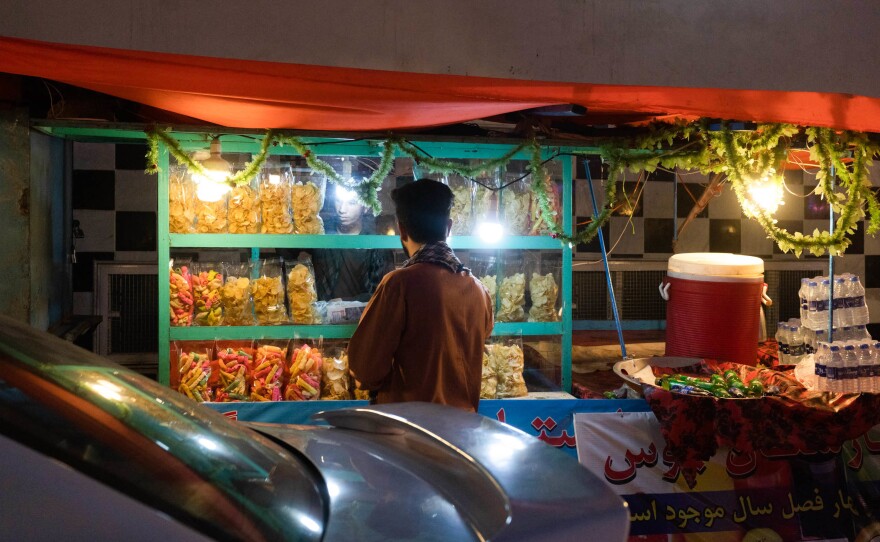A recent visit to Afghanistan showed a country facing an economic crisis. The banking system has seized up. Credit cards aren't working. Afghans abroad struggle to send money to relatives back home.
Under the direction of the Taliban, which seized power one year ago, many government agencies are functioning and also collecting taxes to pay government workers; but times are hard for many. Women sit outside bakeries, hoping someone will buy them bread. Many people, especially women, have lost their jobs. When an NPR team drove through slow traffic in Kabul, children followed our vehicle asking for money; once a girl climbed on the running board and refused to get off.
In the countryside we met Sherif Nazari, 55, who said he once worked as a highway engineer. Now he's unemployed, and nobody is repairing the highway near his house, which was battered during 20 years of war. Nor is anyone rebuilding the mud-walled homes in his village, many of which were destroyed during the fighting. It's hard to imagine where the funds would come from.
Steep inflation has eroded the value of the currency, the Afghani — and the central bank, which is charged with fighting inflation, can't do much about it. Under the former government, Da Afghanistan Bank parked billions of dollars in currency, U.S. Treasury bonds, and gold in the United States. But when the Taliban seized power a year ago, the Biden administration froze the assets. Officials said they didn't want the militant group to seize and misuse the money in the same way that it seized U.S.-made weapons.
One year later, the assets are on the books and even in the storage rooms of the Federal Reserve Bank of New York. President Biden diverted $3.5 billion of the money to potentially pay families of 9/11 victims who have been fighting in court for a share of the funds. Some of the money has gone to Afghan humanitarian relief, and the future status of at least another $3.5 billion is unclear.
We got some insight on the bank's current condition from Shah Mohammad Mehrabi, who is a member of its supreme council, or governing board. Mehrabi was appointed by the former Afghan government. He remains on the job under the new rulers. Mehrabi continues his work even though he lives outside Washington, D.C. and has not been to Afghanistan since the change in power.

Mehrabi maintains that Da Afghanistan Bank once did a respectable job, keeping inflation in single digits despite years of war. But inflation has soared since the Taliban takeover; one analysis finds that the price of basic goods has risen 43% in a year, and the value of the currency, the Afghani, continues to decline.
The currency has not plunged to the levels of the Taliban's previous rule, when a simple meal could cost 600,000 Afghanis and a necessary skill of daily life was quickly counting giant stacks of cash. But savings and salaries are worth far less than in 2021.
"The bank does have money," he said, "but not adequate to be able to perform the necessary function of the central bank."
Yet Mehrabi says bank branches are still open despite the lack of liquidity.
"The Taliban has not really interfered," he said. He chairs the governing board's audit committee, which has overseen the work of auditors who travel to bank offices around the country.
"The audit department had a lot of security problems during the prior administration," he said, but now that the Taliban who once tried to kill the auditors is in charge, "that security problem no longer exists."
One year after the Taliban takeover, neither the U.S. nor any other nation has recognized the Taliban government, and some of its officials are under U.S. sanctions for extremist acts. The U.S. wants assurances that the central bank would be fully independent of the Taliban.
While the Biden administration has taken several steps to get money flowing, especially for humanitarian aid, Mehrabi maintained that "no increase in humanitarian aid can compensate for the macroeconomic harm of soaring prices for basic commodities."
He acknowledged that U.S. concerns are "legitimate," and said that to resume its normal functions, the bank would need "constant monitoring" and to rebuild its professional staff.
Some staff members have left the country. And the Taliban sent home female employees. "The United States spent a lot of money in terms of educating these people," he said, adding that their departure left a "vacuum" to be filled.
The central bank's shortage of funds is far from Afghanistan's only banking problem. Private banks have struggled to do business with foreign banks, which fear potential entanglement with U.S. sanctions against the Taliban. This has complicated both remittances and day-to-day trade.
"The isolation from the international financial system will have to be ceased," Mehrabi warned. He said the country's poverty will only grow worse in the harsh winter months that lie ahead.
Copyright 2022 NPR. To see more, visit https://www.npr.org. 9(MDAzMjM2NDYzMDEyMzc1Njk5NjAxNzY3OQ001))







